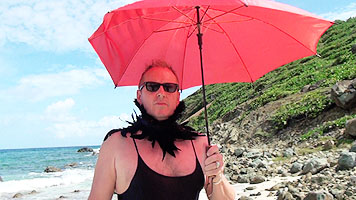|
Climate change and resource consumption
The first
and most important measure for a more social and environmentally
friendly (future) life on earth is a significant reduction of the
world population. All other measures are by far less efficient and
unsustainable.
  

Climate change opinion
The
question here is not to what extent "climate change" is man-made.
It is exclusively about the question of which measure has the
greatest influence on man-made climate change. It is therefore
argued within the framework of the »thought model of man-made
climate change«.
Compared to other topics and issues, the answer is easy to find
scientifically justified. The size of the population has the
strongest and most lasting influence on the climate, assuming
that humans can influence the climate.
To our
surprise, this effect, by far the largest, is almost not addressed,
or more precisely ignored by many scientists, politicians,
journalists and the masses.
This inevitably leads to a credibility problem for “climate
activists” or “climate saviours”, as they like to see themselves.


What "one" should know ... but "nobody is told" ...
If humans have a significant influence on the global
climate, then it must be stated that by far the greatest
"climate-damaging" aspect is man himself, a fact that is
fundamentally not communicated. A reduction of the world population
through strongly reduced reproduction rates is the most efficient
"climate protection". Whether someone in ("Western") Europe drives
more or less cars, uses more or less electricity, ... is of no real
significance in view of the population explosion and massive
industrialisation, especially in Asia and Africa.
external
links
The climate mitigation gap
published
2017
education and government recommendations miss the
most effective individual actions
Reproduction and the carbon legacies of individuals
published 2009
7. Mai 2023
zur Kenntnisnahme und
Selbstanalyse
(Verständigungs-)Basis
der großen Fehlinterpretationen
zum
postulierten Klimawandel
|
What do ice cores tell us
about the history of climate change and the present
trend? This video explains one perspective - arguably
the most accurate one. And if you skip to 2:25, you will
see the huge error we have made and the assumptions and
extrapolations based on that error.
Was sagen uns Eisbohrkerne über die
Geschichte des Klimawandels und den aktuellen Trend?
Dieses Video aus rein wissenschaftlicher Perspektive des
Niels-Bohr-Instituts klärt auf: Nach dem
»Informations-Konsum« von vier Minuten Ton und Bild,
sehen und hören Sie/sie den großen Fehler der gemacht
wurde und erahnen die daraus resultierenden fatal
falschen Annahmen und fatal falschen Extrapolationen,
die auf diesem Fehler basieren: The Climate Change story
told by ice cores……Prof. Jørgen Peder Steffensen erklärt
an Eis-Bohrkernmessungen, das die Temperatur bis etwa
2.200 vor Christus relativ konstant auf einem Niveau,
das um etwa 2,5 Grad über den heute gemessenen Werten
lag. Bis zum Beginn der modernen Zeitrechnung sank die
Temperatur dann auf einen vorläufigen Tiefpunkt, der
ungefähr den Daten aus der zweiten Hälfte des 20.
Jahrhunderts entspricht. Dann wurde wieder es
kontinuierlich wärmer, bis mit der Mittelalterlichen
Warmzeit ein neues Maximum erreicht wurde. Darauf folgte
eine „Kleine Eiszeit“, bis um das Jahr 1875 ein
absoluter Tiefpunkt bezogen auf die vergangenen 10.000
Jahre erreicht wurde – ziemlich genau zu jener Zeit, als
die modernen Aufzeichnungen über Wetter und Klima
begannen. Vergleichende Daten aus China und Nordafrika
bestätigen die Messergebnisse aus Grönland. Das
bedeutet, dass der Referenzpunkt für die letzten
ungefähr 150 Jahre, der kälteste der letzten 10.000
Jahre ist. Somit relativiert sich respektive „verliert
sich basierend auf Willkür des gesetzten zeitlichen
Referenzpunktes" das Postulat einer von Menschen
gemachten globalen Klimaveränderung.
see also
TWITTER-Reaktionen |
  
To your attention
and self-analysis
Claim:
"There is consensus among scientists regarding the strong effect
of CO2 and IPCC temperature projections."
False:
Quite a few scientists who differ from the
IPCC opinion have since withdrawn from the IPCC in frustration
because their interpretations have been ignored. The selection of
scientific papers evaluated by the IPCC is incomplete. The global
weather or climate is basically an inadmissible construct, since it
consists of very different local events in more or less arbitrarily
defined areas. Important climatic processes in the range of natural
climate factors are not taken into account by the IPCC and are also
not run as a possible scenario in the climate models. The IPCC view
can therefore by no means represent a consensus.
General orientation
Numerous examples are known from the history of science where a
majority of scientists were wrong and ultimately the interpretation
of a minority prevailed (e.g. plate tectonics in geology).
Scientific truth cannot be achieved by democratic vote.
  
Weather and climate events that are better left
unreported
...otherwise it might dawn on some people that there is no man-made
climate change, apart from local human excesses of violence against
nature and animals, such as deforestation and
drought caused by wind turbines....
The most extreme (documented) drought catastrophe in Central Europe
to date, which far exceeded the events of the 21st century, occurred
in 1540. An international 32-member research group led by Oliver
Wetter of the University of Bern analysed more than 300
chronicles.
The authors of the study [1] write, among other things...
"The mega-drought of 1540 also highlights that palaeoclimatic
natural archives in particular, such as tree rings or vintage data,
may not be able to detect climatic outliers, whereas social archives
usually describe them very accurately."
The numerous chronicles show that...
The heat from late February to mid-September 1540 caused the
Thuringian Forest to burn in quite a few places and the rivers to
dry up. Even large rivers such as the Rhine, the Seine and the Elbe
"were so small" that people could walk through them. All in all,
forest fires occurred in large parts of Europe. Numerous settlements
and entire towns were incinerated. In Germany alone, 33 towns
burned. ...
[1]
The year-long unprecedented European heat and drought of 1540 - a
worst case
Question
Why does everyone actually want to end up like the
well-known German "climate researcher" Rahmstorf, who writes:
... "We are losing control of the climate system." Mr.
Rahmstorf is losing things he never possessed !?!?!?! What comes
next?
SAVING THE PLANET
by George Carlin
There is a very entertaining "alternative voice" to be heard
(including on the subject of plastic). See the video George
Carlin - Saving the Planet. All in all,
George Carlin's eight minutes are an excellent "theatre
piece" - especially from an epistemological point of view - on the
irrational concerns of a humanity that overestimates itself beyond
measure.
|
[Transcript] "See,
I’m not one of these people who’s worried about
everything. You got people like this around you?
Countries full of them now: people walking around all
day long, every minute of the day, worried… about
everything! Worried about the air; worried about the
water; worried about the soil; worried about
insecticides, pesticides, food additives, carcinogens;
worried about radon gas; worried about asbestos; worried
about saving endangered species. Let me tell you about
endangered species all right? Saving endangered species
is just one more arrogant attempt by humans to control
nature. It’s arrogant meddling; it’s what got us in
trouble in the first place. Doesn’t anybody understand
that? Interfering with nature. Over 90% – over, WAY over
– 90% of all the species that have ever lived on this
planet, ever lived, are gone! Pwwt! They’re extinct! We
didn’t kill them all, they just disappeared. That’s what
nature does. They disappear these days at the rate of 25
a day and I mean regardless of our behaviour.
Irrespective of how we act on this planet, 25 species
that were here today will be gone tomorrow. Let them go
gracefully. Leave nature alone. Haven’t we done enough?
We’re so self-important, so
self-important. Everybody’s gonna save something now:
“Save the trees! Save the bees! Save the whales! Save
those snails!” and the greatest arrogance of all: “Save
the planet!” What?! Are these fucking people kidding me?!
Save the planet?! We don’t even know how to take care of
ourselves yet! We haven’t learned how to care for one
another and we’re gonna save the fucking planet?! I’m
getting tired of that shit! I’m getting tired of that
shit! I’m tired of fucking Earth Day! I’m tired of these
self-righteous environmentalists; these white, bourgeois
liberals who think the only thing wrong with this
country is there aren’t enough bicycle paths! People
trying to make the world safe for their Volvo’s! Besides,
environmentalists don’t give a shit about the planet.
They don’t care about the planet; not in the abstract
they don’t. You know what they’re interested in? A clean
place to live; their own habitat. They’re worried that
someday in the future, they might be personally
inconvenienced. Narrow, unenlightened self-interest
doesn’t impress me.
Besides, there is nothing
wrong with the planet… nothing wrong with the planet.
The planet is fine… the people are fucked! Difference!
The planet is fine! Compared to the people, THE PLANET
IS DOING GREAT: Been here four and a half billion years!
Do you ever think about the arithmetic? The planet has
been here four and a half billion years, we’ve been here
what? 100,000? Maybe 200,000? And we’ve only been
engaged in heavy industry for a little over 200 years.
200 years versus four and a half billion and we have the
conceit to think that somehow, we’re a threat? That
somehow, we’re going to put in jeopardy this beautiful
little blue-green ball that’s just a-floatin’ around the
sun? The planet has been through a lot worse than us.
Been through all kinds of things worse than us: been
through earthquakes, volcanoes, plate tectonics,
continental drifts, solar flares, sunspots, magnetic
storms, the magnetic reversal of the poles, hundreds of
thousands of years of bombardment by comets and
asteroids and meteors, worldwide floods, tidal waves,
worldwide fires, erosion, cosmic rays, recurring ice
ages, and we think some plastic bags and aluminum cans
are going to make a difference?
The planet isn’t going
anywhere… we are! We’re going away! Pack your shit folks!
We’re going away and we won’t leave much of a trace
either, thank God for that… maybe a little styrofoam…
maybe… little styrofoam. The planet will be here, we’ll
be long gone; just another failed mutation; just another
closed-end biological mistake; an evolutionary
cul-de-sac. The planet will shake us off like a bad case
of fleas, a surface nuisance. You wanna know how the
planet’s doing? Ask those people in Pompeii who are
frozen into position from volcanic ash how the planet’s
doing. Wanna know if the planet’s all right? Ask those
people in Mexico City or Armenia or a hundred other
places buried under thousands of tons of earthquake
rubble if they feel like a threat to the planet this
week. How about those people in Kilauea, Hawaii who
build their homes right next to an active volcano and
then wonder why they have lava in the living room?
The planet will be here for
a long, long, LONG time after we’re gone and it will
heal itself, it will cleanse itself cause that’s what it
does. It’s a self-correcting system. The air and the
water will recover, the earth will be renewed, and if
it’s true that plastic is not degradable, well, the
planet will simply incorporate plastic into a new
paradigm: The Earth plus Plastic. The Earth doesn’t
share our prejudice towards plastic. Plastic came out of
the Earth! The Earth probably sees plastic as just
another one of its children. Could be the only reason
the Earth allowed us to be spawned from it in the first
place: it wanted plastic for itself, didn’t know how to
make it, needed us. Could be the answer to our age-old
philosophical question: “Why are we here?” PLASTIC!!!
ASSHOLES!!!
So the plastic is here, our job is done,
we can be phased out now, and I think that’s really
started already, don’t you? I mean, to be fair, the
planet probably sees us as a mild threat; something to
be dealt with, and I’m sure the planet will defend
itself in the manner of a large organism. Like a beehive
or an ant colony can muster a defence, I’m sure the
planet will think of something. What would you do if you
were the planet trying to defend against this pesky,
troublesome species? Let’s see… what might… hmm… viruses!
Viruses might be good. They seem vulnerable to viruses.
And uh… viruses are tricky; always mutating and forming
new strains whenever a vaccine is developed. Perhaps
this first virus could be one that-that compromises the
immune system of these creatures. Perhaps a human
immunodeficiency virus making them vulnerable to all
sorts of other diseases and infections that might come
along and maybe it could be spread sexually, making them
a little reluctant to engage in the act of reproduction.
Well that’s a poetic note
and it’s a start and I can dream can I? See, I don’t
worry about the little things… bees, trees, whales,
snails. I think we’re part of a greater wisdom that we
won’t ever understand, a higher order. Call it what you
want. You know what I call it? The big electron… the big
electron. [Imitates electronic hum] It doesn’t punish,
it doesn’t reward, it doesn’t judge at all. It just is
and so are we… for a little while"…[source] |
November 2022
To your attention and selfanalysis
Electric Cars: Inconvenient Facts [Part
One]
To your attention and selfanalysis
Electric Cars:
Inconvenient Facts
[Part Two]
To your attention and selfanalysis
16. September 2022
|
Carbon
and Climate Catastrophe
by Dr. Patrick
Moore, Co-Founder and former President of
Greenpeace, Director of the CO2 Coalition, Senior Fellow
of The Heartland Institute and author of "Fake Invisible
Catastrophes and Threats of Doom" |
|